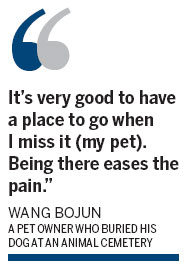More owners choose to pay last respects to pets
By Huang Ying (China Daily)
Wang Bojun says he finds it soothing to spend time in the graveyard where his beloved 10-year-old bulldog was laid to rest in November.
"It's very good to have a place to go when I miss it. Being there eases the pain," Wang said.
Located along the North Sixth Ring Road in the Changping district of Beijing, the pet's final arrangements were taken care of by Baifu Pet Heaven Animal Burial Center, which has been around for more than a decade.
But according to Chen Shaochun, the owner of the center, this kind of service has really grown in popularity in recent years.
The 6.67 hectare site of the pet cemetery was originally intended to have trees planted on it, said Chen.
A pet owner himself, Chen first offered burial plots for dead pets of his colleagues at the China Small Animal Protection Association for free.
"By 2004, more and more pet owners started calling me, asking if they could bury their deceased pets in my forest. So from then on, I decided to run it more professionally, as a pet cemetery," Chen said.
"I reckoned the dead bodies of the animals could serve as organic fertilizer for my trees while at the same time, pet owners could have a place to reminisce about their pets," he added.

It took a fair amount of effort to get the center officially registered with the Beijing Administration for Industry and Commerce, because no laws existed to regulate how people dealt with their dead pets. In fact, there are still no laws today.
As demand grew for his cemetery service, Chen bought a professional electric cremator - at a cost of 300,000 yuan ($47,610) - and took on staff. He now has seven working for him.
He charges between 300 and 400 yuan for a regular size animal - he handles mainly cats and dogs - while larger pet costs 100 or 200 yuan more, Chen said.
At the Bo'ai Companion Animal Burial Service Center, the capital's first officially registered pet crematorium, the cost for cremating a pet up to 20 kg in weight is 500 yuan, and for one heavier than that, it increases to 800 yuan, said its general manager Liao Yumin.
Chen said that around 60 percent of Baifu's customers choose to have their pet cremated, with the rest preferring burial.
Wang Bojun liked the thought of having his dog buried under a tree, in a place he found comforting to visit.
Wang actually spent 6,000 yuan, for the complete after-death services, including the burial plot, a tombstone and casket.
The price of a standard burial plot - 1.5 square meters of land under a tree - is 1,500 yuan, but some people don't think that's big enough for their "babies", added Chen.
"A few years ago, a man flew back from the United States specially to find a good place to bury his dog, and he bought 12 plots here," Chen recalled.
That beloved dog still holds the graveyard's space record, but since 2011, Chen has limited customers from purchasing plots in advance to prevent similar cases of extravagance.
In the past, he said many people were buying more than one plot for just one animal, to leave space for future pets.
"But, year after year, the 'other pets' never appeared," Chen said.
More than 3,000 burial plots in the Baifu pet center have been occupied, with about 10,000 still available.
"Only about 20 percent of pet owners who have their pets cremated here, then choose to bury them in the cemetery - the rest prefer to take the remains home," said Chen. People come to visit their pets at any time, not just during Qingming Festival, or Tomb Sweeping Day, he said.
Wang added he visited his deceased bulldog every fortnight since it died.
While dogs and cats make up 80 percent of the animals buried there, the rest include rabbits, monkeys, snakes, birds, and even fish.
Customers can opt to buy their funeral items, often cheaper, from outside the cemetery, but Chen said he encourages people not to be spendthrifts, out of respect for their beloved animals.
About 90 percent of Chen's customers live in Beijing, but he has had customers arriving from all over China, including Tianjin and Xinjiang Uygur autonomous region, and even abroad.
He calls on the government to draft proper rules and regulations governing his type of business, which he says will only grow larger as demand increases. But he fears that if nothing is put in place, there is always the danger of being closed down.
Liao said, about 500 dogs and cats die every day in the capital, but his center only receives about 30 animals every month.
Chen's business cremates around 150 animals a month, but he believes there is huge potential in the market, given the conservative estimate of more than a million dogs in Beijing alone.
huangying@chinadaily.com.cn